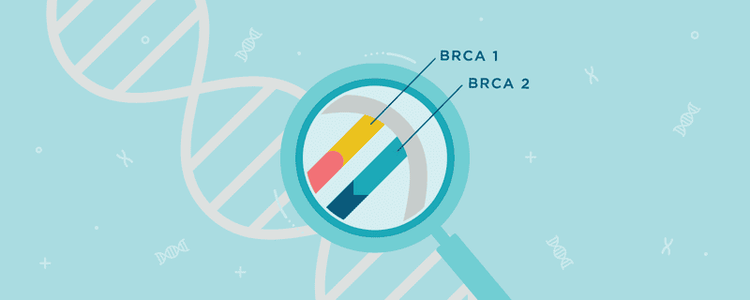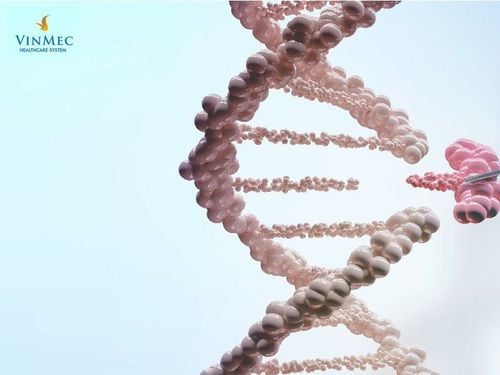This is an automatically translated article.
Genetic testing in breast and ovarian cancer risk assessment is to look for mutations in the BRCA1 and BRCA2 genes. These are the genes most commonly affected in hereditary breast and ovarian cancers.
1. What is genetic testing?
Genetic testing in breast cancer risk assessment, ovarian cancer risk to determine if you are a carrier of either BRCA1 or BRCA2 mutated genes.
Genetic testing procedure is non-invasive and it is done through blood test. Your blood will be examined under a microscope in a lab, and experts will evaluate the DNA in your white blood cells.
Before and after genetic testing, you will receive genetic counseling by a specialized healthcare professional.
Genetic counseling before genetic testing includes:
Ask and take a complete, detailed record of your family history. Discuss related tests and their accuracy. How will you get a gene test? A brief overview of available medical treatments once you receive your test results. Emotional and psychological impact of genetic testing and outcomes. Risks associated with passing on the mutated gene to your child. Genetic testing for breast cancer can be emotional, so doctors encourage you to discuss genetic testing with your oncologist (if diagnosed with cancer) or your treating doctor. as well as family and loved ones soon.
If you have any emotions before, during or after genetic testing, you should talk to your doctor to get help as soon as possible.

After genetic testing, you will be informed of the results and post-test counseling. This consultation is important to help you understand the test results and decide what to do next for you and your family:
A positive test result means you have a BRCA1 or BRCA2 gene mutation. and have a higher risk of breast and ovarian cancer. This can also affect your family members.
What testing means to you:
You can take steps to reduce your chances of getting cancer or find cancer early if you do. If you have breast or ovarian cancer, a positive genetic test result can help you make treatment decisions. What testing means for your family:
Your family members can get genetic testing to see if they have the same mutated gene as you. Your parents, siblings, children will have a 50% chance of having the same genetic mutation as you. A negative test result: means you do not carry a BRCA1 or BRCA2 gene mutation. However, there are also cases of false negatives, so your doctor will need to discuss with you the validity of the test results and whether the test needs to be repeated. A negative test result can be ambiguous, as there is still a very low chance that genetic testing will miss the mutation in people with a family history.
If you have had breast or ovarian cancer and have a negative genetic test, what does that mean?
What the test means to you: a negative result means that the test did not find the gene mutation that caused your cancer. However, your doctor may recommend one more test.
What testing means for families:
If anyone in your family has breast or ovarian cancer, it's less likely to be caused by an inherited gene mutation, unless one another family member has a gene mutation. Genetic testing in other members of your family who do not have breast or ovarian cancer is not helpful, unless someone else in the family has the mutated gene. In some cases, genetic testing may still be helpful for some members of your family. This is because it is still possible to have a genetic mutation in your family, but you did not inherit it.

If you do not have breast or ovarian cancer and you have a negative genetic test result, what does this result mean?
What the test means for you:
It means that you don't carry a BRCA1 or BRCA2 gene mutation, you have a lower risk of breast cancer, ovarian cancer. You certainly don't pass the mutation on to your children. What testing means for your family: If someone in your family has breast or ovarian cancer, it may not be caused by an inherited genetic mutation.
Result of variant of undetermined significance (VUS): in some cases, genetic testing results can find gene mutations in BRCA1 or BRCA2 that were not previously associated with an increased risk cancer muscle. Some mutations prevent genes from working properly, while others do not. It's not always easy to tell whether this gene mutation is harmful.
If you have had breast or ovarian cancer, it is not known whether the mutation found will cause your cancer. If you haven't had breast or ovarian cancer, you're still thought to have a higher risk of hereditary cancer.

2. Who needs genetic testing?
Not all women need genetic testing for mutated genes associated with breast and ovarian cancer. Usually genetic testing is recommended for people with:
A family history of breast or ovarian cancer. People who have had breast cancer and meet certain criteria such as: age at diagnosis, type of cancer, presence of certain other cancers or cancer of both breasts, family health history. People diagnosed with invasive epithelial ovarian cancer, fallopian tube cancer, primary peritoneal cancer, and breast cancer. In the family there is a BRCA1, BRCA2 mutation, or another genetic mutation. People with risk factors for breast cancer, ovarian cancer. It is important that you discuss genetic testing with your doctor as there may be other reasons why you may need it.
Trắc nghiệm: Những lầm tưởng và sự thật về ung thư vú
Ung thư vú có tỷ lệ tử vong cao nhất ở nữ giới khiến họ rất lo sợ bản thân mắc phải căn bệnh này. Tuy nhiên, không ít chị em có những hiểu biết thái quá về ung thư vú. Thử sức cùng bài trắc nghiệm sau sẽ giúp bạn loại bỏ được những nghi ngờ không đúng về căn bệnh này.
Bài dịch từ: webmd.com
3. What if you test positive for a mutated gene?
If you have inherited a mutated gene that causes cancer, you should discuss the next steps in your treatment with your oncologist.
When a faulty gene that increases the risk of breast or ovarian cancer is identified, genetic testing may be recommended for other family members. Any member of the family can inherit a mutated gene. Members with a mutated gene should speak with an oncologist to learn how to reduce their risk.
Some women who are positive for genetic testing who are carriers of the mutated gene but have not been diagnosed with cancer may opt for risk-reducing surgery such as a mastectomy. If this surgery is not performed, people 30 years of age and older are advised to have an annual breast MRI and/or drug treatment if needed. To reduce the risk of ovarian cancer, women may consider removal of the ovaries and fallopian tubes, or, if recommended, a hysterectomy.
There is some evidence that women who have used oral contraceptives for 5 years or more have a reduced risk of developing ovarian cancer. However, this is not true for all women.
It is important that you talk to your doctor or genetic counselor to find out what measures you can take to reduce your risk of breast cancer, your risk of ovarian cancer.
Just because a person has a family history of breast and ovarian cancer does not mean that he or she definitely has a genetic mutation. A person with mutations in the BRCA1 and/or BRCA2 genes means that he or she has a higher risk of breast cancer, cervical cancer than the general population, not that he or she definitely has these diseases.
Currently, Vinmec International General Hospital deploys the Package for screening and early detection of breast cancer and gynecological cancer by combining 4 technologies: genetic testing, endoscopy, ultrasound and immunological testing . In particular, cancer screening with genetic technology is a method that is considered a breakthrough in medicine.
Early screening is considered the "golden key" to detect and provide prevention methods, reduce the risk of death and costs for patients. Due to late detection (70% of patients are treated when they are at the end stage), the death rate from cancer in Vietnam is very high.
Please dial HOTLINE for more information or register for an appointment HERE. Download MyVinmec app to make appointments faster and to manage your bookings easily.













